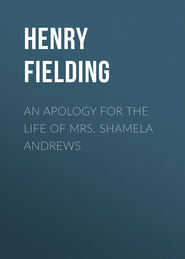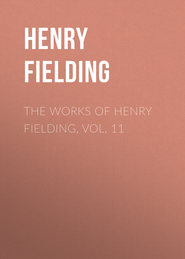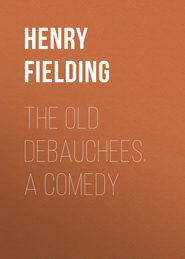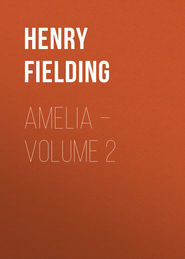По всем вопросам обращайтесь на: info@litportal.ru
(©) 2003-2024.
✖
Amelia – Complete
Настройки чтения
Размер шрифта
Высота строк
Поля
“I have lost my money at play,” answered he.
“Pugh!” said she, recovering herself – “what signifies the trifle you had in your pocket? Resolve never to play again, and let it give you no further vexation; I warrant you, we will contrive some method to repair such a loss.”
“Thou heavenly angel! thou comfort of my soul!” cried Booth, tenderly embracing her; then starting a little from her arms, and looking with eager fondness in her eyes, he said, “Let me survey thee; art thou really human, or art thou not rather an angel in a human form? O, no,” cried he, flying again into her arms, “thou art my dearest woman, my best, my beloved wife!”
Amelia, having returned all his caresses with equal kindness, told him she had near eleven guineas in her purse, and asked how much she should fetch him. “I would not advise you, Billy, to carry too much in your pocket, for fear it should be a temptation to you to return to gaming, in order to retrieve your past losses. Let me beg you, on all accounts, never to think more, if possible, on the trifle you have lost, anymore than if you had never possessed it.”
Booth promised her faithfully he never would, and refused to take any of the money. He then hesitated a moment, and cried – “You say, my dear, you have eleven guineas; you have a diamond ring, likewise, which was your grandmother’s – I believe that is worth twenty pounds; and your own and the child’s watch are worth as much more.”
“I believe they would sell for as much,” cried Amelia; “for a pawnbroker of Mrs. Atkinson’s acquaintance offered to lend me thirty-five pounds upon them when you was in your last distress. But why are you computing their value now?”
“I was only considering,” answered he, “how much we could raise in any case of exigency.”
“I have computed it myself,” said she; “and I believe all we have in the world, besides our bare necessary apparel, would produce about sixty pounds: and suppose, my dear,” said she, “while we have that little sum, we should think of employing it some way or other, to procure some small subsistence for ourselves and our family. As for your dependence on the colonel’s friendship, it is all vain, I am afraid, and fallacious. Nor do I see any hopes you have from any other quarter, of providing for yourself again in the army. And though the sum which is now in our power is very small, yet we may possibly contrive with it to put ourselves into some mean way of livelihood. I have a heart, my Billy, which is capable of undergoing anything for your sake; and I hope my hands are as able to work as those which have been more inured to it. But think, my dear, think what must be our wretched condition, when the very little we now have is all mouldered away, as it will soon be in this town.”
When poor Booth heard this, and reflected that the time which Amelia foresaw was already arrived (for that he had already lost every farthing they were worth), it touched him to the quick; he turned pale, gnashed his teeth, and cried out, “Damnation! this is too much to bear.”
Amelia was thrown into the utmost consternation by this behaviour; and, with great terror in her countenance, cried out, “Good Heavens! my dear love, what is the reason of this agony?”
“Ask me no questions,” cried he, “unless you would drive me to madness.”
“My Billy! my love!” said she, “what can be the meaning of this? – I beg you will deal openly with me, and tell me all your griefs.”
“Have you dealt fairly with me, Amelia?” said he.
“Yes, surely,” said she; “Heaven is my witness how fairly.”
“Nay, do not call Heaven,” cried he, “to witness a falsehood. You have not dealt openly with me, Amelia. You have concealed secrets from me; secrets which I ought to have known, and which, if I had known, it had been better for us both.”
“You astonish me as much as you shock me,” cried she. “What falsehood, what treachery have I been guilty of?”
“You tell me,” said he, “that I can have no reliance on James; why did not you tell me so before?”
“I call Heaven again,” said she, “to witness; nay, I appeal to yourself for the truth of it; I have often told you so. I have told you I disliked the man, notwithstanding the many favours he had done you. I desired you not to have too absolute a reliance upon him. I own I had once an extreme good opinion of him, but I changed it, and I acquainted you that I had so – ”
“But not,” cries he, “with the reasons why you had changed it.”
“I was really afraid, my dear,” said she, “of going too far. I knew the obligations you had to him; and if I suspected that he acted rather from vanity than true friendship – ”
“Vanity!” cries he; “take care, Amelia: you know his motive to be much worse than vanity – a motive which, if he had piled obligations on me till they had reached the skies, would tumble all down to hell. It is vain to conceal it longer – I know all – your confidant hath told me all.”
“Nay, then,” cries she, “on my knees I entreat you to be pacified, and hear me out. It was, my dear, for you, my dread of your jealous honour, and the fatal consequences.”
“Is not Amelia, then,” cried he, “equally jealous of my honour? Would she, from a weak tenderness for my person, go privately about to betray, to undermine the most invaluable treasure of my soul? Would she have me pointed at as the credulous dupe, the easy fool, the tame, the kind cuckold, of a rascal with whom I conversed as a friend?”
“Indeed you injure me,” said Amelia. “Heaven forbid I should have the trial! but I think I could sacrifice all I hold most dear to preserve your honour. I think I have shewn I can. But I will – when you are cool, I will – satisfy you I have done nothing you ought to blame.”
“I am cool then,” cries he; “I will with the greatest coolness hear you. – But do not think, Amelia, I have the least jealousy, the least suspicion, the least doubt of your honour. It is your want of confidence in me alone which I blame.”
“When you are calm,” cried she, “I will speak, and not before.”
He assured her he was calm; and then she said, “You have justified my conduct by your present passion, in concealing from you my suspicions; for they were no more, nay, it is possible they were unjust; for since the doctor, in betraying the secret to you, hath so far falsified my opinion of him, why may I not be as well deceived in my opinion of the colonel, since it was only formed on some particulars in his behaviour which I disliked? for, upon my honour, he never spoke a word to me, nor hath been ever guilty of any direct action, which I could blame.” She then went on, and related most of the circumstances which she had mentioned to the doctor, omitting one or two of the strongest, and giving such a turn to the rest, that, if Booth had not had some of Othello’s blood in him, his wife would have almost appeared a prude in his eyes. Even he, however, was pretty well pacified by this narrative, and said he was glad to find a possibility of the colonel’s innocence; but that he greatly commended the prudence of his wife, and only wished she would for the future make him her only confidant.
Amelia, upon that, expressed some bitterness against the doctor for breaking his trust; when Booth, in his excuse, related all the circumstances of the letter, and plainly convinced her that the secret had dropt by mere accident from the mouth of the doctor.
Thus the husband and wife became again reconciled, and poor Amelia generously forgave a passion of which the sagacious reader is better acquainted with the real cause than was that unhappy lady.
Chapter vii. – In which Booth receives a visit from Captain Trent
When Booth grew perfectly cool, and began to reflect that he had broken his word to the doctor, in having made the discovery to his wife which we have seen in the last chapter, that thought gave him great uneasiness; and now, to comfort him, Captain Trent came to make him a visit.
This was, indeed, almost the last man in the world whose company he wished for; for he was the only man he was ashamed to see, for a reason well known to gamesters; among whom, the most dishonourable of all things is not to pay a debt, contracted at the gaming-table, the next day, or the next time at least that you see the party.
Booth made no doubt but that Trent was come on purpose to receive this debt; the latter had been therefore scarce a minute in the room before Booth began, in an aukward manner, to apologise; but Trent immediately stopt his mouth, and said, “I do not want the money, Mr. Booth, and you may pay it me whenever you are able; and, if you are never able, I assure you I will never ask you for it.”
This generosity raised such a tempest of gratitude in Booth (if I may be allowed the expression), that the tears burst from his eyes, and it was some time before he could find any utterance for those sentiments with which his mind overflowed; but, when he began to express his thankfulness, Trent immediately stopt him, and gave a sudden turn to their discourse.
Mrs. Trent had been to visit Mrs. Booth on the masquerade evening, which visit Mrs. Booth had not yet returned. Indeed, this was only the second day since she had received it. Trent therefore now told his friend that he should take it extremely kind if he and his lady would waive all ceremony, and sup at their house the next evening. Booth hesitated a moment, but presently said, “I am pretty certain my wife is not engaged, and I will undertake for her. I am sure she will not refuse anything Mr. Trent can ask.” And soon after Trent took Booth with him to walk in the Park.
There were few greater lovers of a bottle than Trent; he soon proposed therefore to adjourn to the King’s Arms tavern, where Booth, though much against his inclination, accompanied him. But Trent was very importunate, and Booth did not think himself at liberty to refuse such a request to a man from whom he had so lately received such obligations.
When they came to the tavern, however, Booth recollected the omission he had been guilty of the night before. He wrote a short note therefore to his wife, acquainting her that he should not come home to supper; but comforted her with a faithful promise that he would on no account engage himself in gaming.
The first bottle passed in ordinary conversation; but, when they had tapped the second, Booth, on some hints which Trent gave him, very fairly laid open to him his whole circumstances, and declared he almost despaired of mending them. “My chief relief,” said he, “was in the interest of Colonel James; but I have given up those hopes.”
“And very wisely too,” said Trent “I say nothing of the colonel’s good will. Very likely he may be your sincere friend; but I do not believe he hath the interest he pretends to. He hath had too many favours in his own family to ask any more yet a while. But I am mistaken if you have not a much more powerful friend than the colonel; one who is both able and willing to serve you. I dined at his table within these two days, and I never heard kinder nor warmer expressions from the mouth of man than he made use of towards you. I make no doubt you know whom I mean.”
“Upon my honour I do not,” answered Booth; “nor did I guess that I had such a friend in the world as you mention.”
“I am glad then,” cries Trent, “that I have the pleasure of informing you of it.” He then named the noble peer who hath been already so often mentioned in this history.
Booth turned pale and started at his name. “I forgive you, my dear Trent,” cries Booth, “for mentioning his name to me, as you are a stranger to what hath passed between us.”
“Nay, I know nothing that hath passed between you,” answered Trent. “I am sure, if there is any quarrel between you of two days’ standing, all is forgiven on his part.”
“D – n his forgiveness!” said Booth. “Perhaps I ought to blush at what I have forgiven.”
“You surprize me!” cries Trent. “Pray what can be the matter?”
“Indeed, my dear Trent,” cries Booth, very gravely, “he would have injured me in the tenderest part. I know not how to tell it you; but he would have dishonoured me with my wife.”
“Sure, you are not in earnest!” answered Trent; “but, if you are, you will pardon me for thinking that impossible.”
“Indeed,” cries Booth, “I have so good an opinion of my wife as to believe it impossible for him to succeed; but that he should intend me the favour you will not, I believe, think an impossibility.”
“Faith! not in the least,” said Trent. “Mrs. Booth is a very fine woman; and, if I had the honour to be her husband, I should not be angry with any man for liking her.”
“But you would be angry,” said Booth, “with a man, who should make use of stratagems and contrivances to seduce her virtue; especially if he did this under the colour of entertaining the highest friendship for yourself.”












